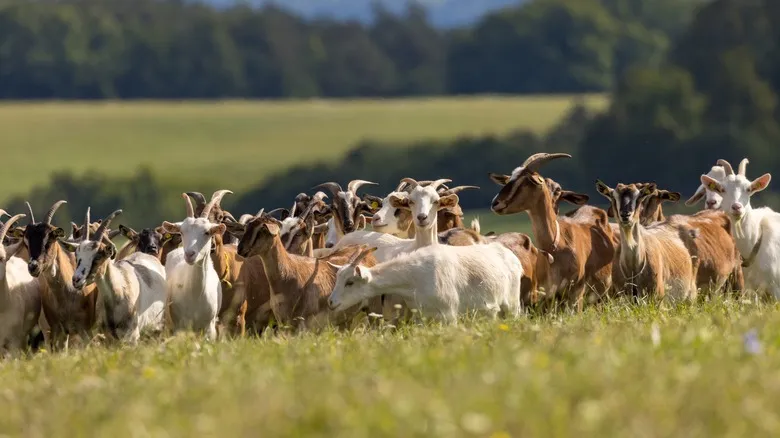The legend of Kaldi the goat herder

The most famous origin story of coffee is that of Kaldi, the goat herder. According to legend, Kaldi lived in Abyssinia (now Ethiopia) around A.D. 850. One day, while tending to his goats in the highlands, he observed a remarkable change in their behavior. The usually calm animals were prancing about and bleating excitedly. Curious about this unusual activity, Kaldi discovered that his goats were feasting on a bush filled with red berries. Intrigued, he decided to try the berries himself and experienced a delightful surge of energy, as each berry contained what we now recognize as a coffee bean.
Kaldi took the berries to a nearby monastery, where a monk condemned them as the work of the devil and angrily tossed them into a fire. As the berries burned, the monk caught a whiff of the roasted aroma and found it so appealing that he hurried to rescue the berries from the flames. In his attempt to extinguish them, he crushed the coffee beans and placed them in hot water, hoping to revive them. This moment is often credited as the creation of the first cup of coffee, although the story is likely more myth than fact.
Despite its widespread retelling, there is no concrete evidence supporting the tale of Kaldi. It first appeared in one of the earliest books about coffee, written by Antoine Faustus Nairon, a Maronite Roman professor of Oriental languages, which was published in 1671—almost a millennium after Kaldi was said to have lived.
Other coffee origin stories

Kaldi's story is undoubtedly the most popular theory about the origins of coffee, but there are numerous other legends, all of which lack substantial evidence. One such tale suggests that civets played a role in spreading coffee across Africa by dispersing the seeds through their droppings. Although there is minimal proof to support this narrative, civets are known to consume coffee cherries, leading to the production of the controversial Kopi Luwak coffee.
Yemeni folklore presents a few different stories about coffee's beginnings, one of which points to Ethiopia as the birthplace of the coffee plant. According to this legend, a Sufi mystic on a spiritual quest in Ethiopia observed a group of birds pecking at a bush laden with red berries. Feeling fatigued from his journey, he decided to try the berries himself and discovered their invigorating effects.
Another story tells of a Sheik from the Yemeni city of Mocha who was exiled by the king and found himself wandering the mountains, nearly starving. When he stumbled upon a coffee bush, he tasted the berries but found them too bitter. In an effort to improve the flavor, he roasted and boiled them, thus creating the first cup of coffee. In some variations of this tale, the Sheik calls upon the spirit of his master for assistance, and a bird descends with a branch of coffee berries. Other versions suggest that the Sheik enjoyed the taste of the berries, and that his first cup of coffee was actually a soup he concocted.
The word coffee may be tied to this mythos

The etymology of the word "coffee" is nearly as enigmatic as the drink itself. One theory connects it to the legend of Kaldi, who is believed to have resided in the Ethiopian region of Kaffa. This name closely resembles "coffee" and is even more similar to terms in other languages, such as the German "kaffe." If Kaldi's tale were factual, it could be the likely source of the beverage's name; however, just as his story lacks substantiation, there is no definitive evidence that coffee was named for this reason. Conversely, there is also no proof to suggest otherwise.
The term "coffee" has its roots in Arabic (Ethiopians refer to it as "b?no"), and while it’s conceivable that Arabs named it after its region of origin, alternative theories have emerged. The English word "coffee" was derived from the Turkish "kahve," which in turn comes from the Arabic "qahwa." It is believed that, in ancient times, "qahwa" referred to wine, but due to the prohibition of alcoholic drinks in Islam, coffee became known as the "wine of Arabia."
One aspect of coffee lore that is connected to its name is the Starbucks mocha you enjoy, which is named after the Yemeni city of Al-Mukh?, commonly known as Mocha. This city has historically been a vital port in the coffee trade. You may remember the legendary Sheik Omar, who was said to hail from Mocha; regardless of his existence, his hometown undeniably played a significant role in the history of coffee.
Recommended

The Olive Oil Brand Behind Starbucks' Oleato Coffee

The Easiest Way To Grind Coffee Beans Without A Grinder On Hand

Burr Grinders Are Your Secret Weapon For Full-Bodied Coffee Every Time

The Safe Way To Freeze And Thaw Liquid Coffee Creamer
Next up

